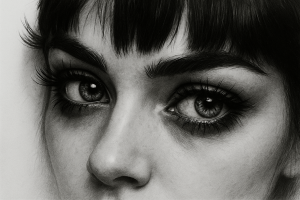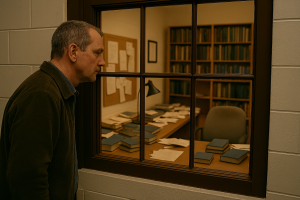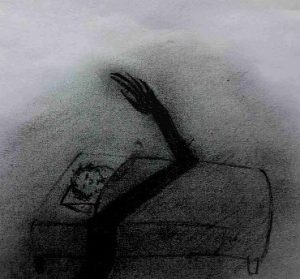 Writer Advice had to make some tough choices to select this year’s winners of our Flash Prose Contest. You’ll find we’re sharing all kinds of stories.
Writer Advice had to make some tough choices to select this year’s winners of our Flash Prose Contest. You’ll find we’re sharing all kinds of stories.
The winners are listed below along with the dates when their pieces will appear. The first piece is posted today, and the rest will be post on Tuesdays. Please check in weekly to see what we liked and why they became winners.
Interested in sharing your Flashes with Writer Advice? The current contest is for Dribbles, Drabbles, and MicroFiction. We’re looking for all kinds of prose, from fiction and non-fiction, to lists, letters, and texts. Bet you have something under 500 words that suits our needs. Thanks!
Looking for Scintillating Starts? We still offer that service. Please write for details.
The Winners Are
Vivienne’s Eyes
By Hoiland Ames
 She turns, ever so slightly. I can feel her eyes on me, and oh my God, those eyes . . . .
She turns, ever so slightly. I can feel her eyes on me, and oh my God, those eyes . . . .
How to describe Vivienne’s eyes?
They are not easy eyes; neither soft nor warm like a mother, nor exalted and lit like a lover. Sooty lashes, almond of shape, haunted, so dark they’re almost black; smoldering, intelligent, locked. Her smile rarely lands there. This is no seductress. She is Justice without the blind. There’s no sparkle, only gravity, and an almost gnostic perception – all-seeing, unfeeling, feral, awake.
Like me.
And I know.
She is one of my kind.
@@@
Hoiland Ames writes fiction about obsession, desire, and the bargains people make. Ames is at work on a debut novel. Recent pieces include Science Fair, A Conspiracy of Fate, and The Modern Mondego.
Editor’s Reaction: This narrator knows exactly what to say (and what to skip) to make a powerful impression. This makes a point and makes us curious about Vivienne and the narrator.
What If Freedom Hurts
By Sascha Easley
 In the examination room, I lay on the table with my legs parted and trembling, the paper gown rustling beneath me like dry leaves in a storm. A hammering noise echoed from somewhere behind the sterile curtain, a mechanical reminder that this wasn’t a dream. I cried out—not from pain, but fear. Deep, gut-twisting fear.
In the examination room, I lay on the table with my legs parted and trembling, the paper gown rustling beneath me like dry leaves in a storm. A hammering noise echoed from somewhere behind the sterile curtain, a mechanical reminder that this wasn’t a dream. I cried out—not from pain, but fear. Deep, gut-twisting fear.
“It’s okay. You’re going to be okay,” the counselor said, her voice like gauze trying to wrap a wound too deep to bandage.
But I wasn’t okay. I wasn’t going to be okay.
My mother stood in the corner, silent and stiff like a shadow I couldn’t reach. Her arms were crossed, her jaw set. I needed her—to hold me, to tell me I wasn’t bad, to brush my hair back and whisper that I was still hers. But she couldn’t. Her silence was louder than my scream.
The nurse inserted something into my IV line, and within seconds, I was out.
I woke up in a brown recliner, surrounded by seven other girls. We were all wrapped in pink paper blankets, flimsy as our dignity. None of us spoke, but we didn’t have to. Our silence was thick with grief. Some stared blankly at the wall. Others wept openly. There was no judgment between us. Only knowing.
We had just aborted our babies.
They called it the recovery room. But what exactly were we recovering from? Our pregnancies? Or the irreversible decision we’d just made in exchange for freedom we didn’t ask for?
I couldn’t stop thinking about what had just happened—how something sacred had been pulled from me like a secret I could never take back. I thought of the sound I heard in the procedure room—the suction—and how it mimicked the ache in my chest, like my soul was being vacuumed out too. A future had been emptied from my womb into an oversized glass jar, veiled with the same pink paper that now clung to my skin.
I glanced around the room. None of us were empowered. We were broken. We weren’t reclaiming our bodies; we were learning to carry a grief that didn’t have a name.
And still, I knew—somewhere deep inside—that the choice had been made out of love. Or at least, what my mother believed was love. She had tried to protect me from walking the same hard road she did as a teenage mother. She wanted to rewrite the story, even if it meant tearing mine apart in the process.
Her decision gave me freedom. But no one told me that freedom could ache like this.
I didn’t need politics or permission. I needed my mother. I needed her to see past her disappointment and remember who I was before the mistake, before the pain. I needed her to sit beside me in that recovery room and wipe my tears with grace instead of judgment. But she had already distanced herself. She had already abandoned me—just like my father once had—and that pain lodged in my chest like a second loss.
The truth is that abortion isn’t always a clean break. It’s messy and layered and lingers in the shadows of a woman’s life, sometimes forever. The what-ifs stretch into your future like phantom limbs: What if I had kept the baby? What if I had been stronger? What if I had someone to help me?
I think of that pink paper often—the way it wrapped around us, not to protect, but to conceal. To mute our stories. But our stories matter. My story matters.
That day, I lost more than a pregnancy. I lost the girl who believed she could count on her mother’s love no matter what. I lost the version of myself who believed that healing would come quickly.
But I also found something in that room. I found a connection with the other girls, a sacred sisterhood no one could explain. I found a voice I didn’t know I had, and eventually, I used it—to write, to speak, to grieve.
Some scars don’t fade. They become part of your story, stitched into the fabric of who you are.
I don’t regret my freedom, but I mourn the price. And sometimes, when it’s quiet, I still whisper “I’m sorry” to the life I didn’t get to know.
Because even freedom comes with a cost.
@@@
Sascha Ealey is a memoirist and storyteller whose work explores healing, faith, and resilience. A 2022 published author and writing coach, she empowers women to unearth their truths and romanticize everyday life through books, coloring books, and storytelling. Her mission is to help others find healing, hope, and beauty in the stories they carry.
Last Summer
By Robert Granader
 Deep into the summer when the days are long and she gets lonely, I return to a small college town in the Midwest.
Deep into the summer when the days are long and she gets lonely, I return to a small college town in the Midwest.
She’s well into her eighties now. Her body is wilting, but her mind is clear. She knows who I am. And I know far too well who she is. Her will, like always, is unbending. That’s why she still lives in this house, on this land, all alone twenty years since my father passed.
She tells me she’ll pick me up at the airport—because she always did. But she doesn’t. She won’t. She shouldn’t.
I taxi the hour into town, the summer haze hangs like gauze over everything: The trees, the car windows, the benches—coated in a grime that July spreads and no one tries to clean until college football season.
When I return to that part of the country I am a child again, trying to squeeze every last drop out of summer before school starts.
Only, I haven’t lived by a school calendar since my youngest graduated college five years ago.
I arrive around four. Dinner is already in the oven. That gives us enough time for a light catch-up—health updates, town gossip, all stories I’ve heard—before she retires for the night at seven.
After she shuts her door, I wait for the familiar sound of the blinds being drawn—blocking out the last rays of the long summer sun. Out here, on the far west side of the eastern time zone, the sun doesn’t set until nearly ten, giving me hours to walk the campus, to find the memories I left scattered here last summer.
I grew up in this college town. My father, a literature professor, taught the American classics. I think of him as I return, walking the near-empty campus, past the gym, the old basketball court, the lecture hall. Places I knew as well as my own limbs. Places where I learned the names of the trees, the sound of cicadas, how to shoot a jump shot, what marijuana smelled like.
It’s where I watched my father teach.
He was barely five-six, but in front of a class, he elevated. Standing behind the lectern, he transformed—soft-spoken, but commanding. A man who never had to tell you he was smart. You knew by the weight of his silences.
From outside I peer through the window of what used to be his office. It’s someone else’s now—photos of a different family, different awards, different messy stacks of paper. A person I do not know and who does not know me, or even my father. They’ve been there long enough to have their clippings fade to yellow. The room has moved on.
And I am struck, for maybe the first time, with the obvious fact that these walls are agnostic and were never really mine. The gym is not my home court —it’s just a cracked black top with a rim and no net. And this office is just four walls waiting for someone to cover them up.
None of it is what I thought. These places were only sacred because I believed they were. These were ours, but only when they are locked in my memory. But in real life these shared places belong to someone else, but I haven’t been fairly compensated.
By the time I walk back to the house, I’m exhausted—not just from miles, but from the years. Time travel, as it turns out, is a full-body effort. I’ve traveled through time-zones, and I’ve made it back knowing there won’t be many more of these.
Someday soon even this house will belong to someone else. The part-home, part-farm, where my mother still keeps a coterie of small animals — chickens, a pig and her beloved horse—named for our college mascot.
I try to remember everything about these faded walls because I know that when she dies the house will be sold and I’ll have no reason to return. Well, only selfish reasons and in middle-age we don’t visit places just for ourselves.
I watch her through the window, this old woman walking across the yard with a shallow bowl of feed. I imagine a time when someone else is standing in this kitchen, watching a younger person doing some kind of work in this yard.
That’s if the house still stands, already sagging under the weight of all these memories—groaning, holding tight to its last summer.
@@@
Robert Granader’s articles, essays and short stories have appeared in over 90 publications including New York Times, Washington Post, and Stonecoast Review. He writes about memory, family, and the quiet strangeness of everyday life. His short story collection was published in 2022, and he is currently working on a novel about brothers.
By Mi West
 He fastens the belt and recaps the forecast: enjoyable weather, no sudden gusts, looks like returning timely for dinner with wife and kids. Unexpected fragments of a dream last night, about guardian angels, pop up now.
He fastens the belt and recaps the forecast: enjoyable weather, no sudden gusts, looks like returning timely for dinner with wife and kids. Unexpected fragments of a dream last night, about guardian angels, pop up now.
Cockpits and the climb from gravity to freedom set his spirit soaring. Becoming a moviemaker? Surgery star? No way. When a five-year old is allowed into a cockpit, it makes him see the light and go for it. Off-Earth hours are what counts in earthly life. After thousands of flight hours, wings feel like body parts.
Door shut, breezeway retracted, deicing quick as lightning. Tailwind on route, tailwind in life. Go climb the sky! The pre-takeoff checklist sounds celestial: Parking brake set. Flaps set. Engines running normally.
Brake released in an engine-roar glissando by a cockpit virtuoso. He accelerates past Point of No Return. Nose wheel off the ground. Takeoff. Throttle auto. Steep Initial Climb, dancing with the forces of nature.
* * *
All of a sudden, ice slams into a tail engine. It stalls completely. Seconds feel like hours. Passengers pray, and flight attendants urge them to sit in a safe position. Stomach stiffened up, he immediately applies the emergency checklist. His mind goes autopilot, responding to an eruption of alarms. He’s been through worst-case scenarios on simulators. Juniors often wondered if that unlikely mess was worthwhile. It was and is. Level flight. U-turn to get back…
He hears another ice bang. The other engine stalls too. They’re caught in a jet plane without propulsion. A hundred humans are aluminum-canned in fatal silence. “Your last seconds,” he thinks airspeed hisses through the windshield. He struggles to stay calm in a steep gliding descent through the clouds. His copilot reports to tower: A forced landing. Mayday. Engines not operational.
This time, it’s not a simulation. He discerns a field, beyond the dark forests below, and has just enough speed left to get close.
Trees start drumming a roll on the belly as the tail cracks some pine tops. Speed barely enough to take him past the last trees. Seconds still feel like hours to him.
He hits the ground, tail first, plowing the field in a Symphony of Destiny, fates knocking on the door, hammering, smashing, kicking… A final chord of discord fades out into silence.
A fuselage in two pieces mimics a crumbled tombstone, on a field converted into a muddy battlefield. He smells a premonitory scent of a fuel leak. A flight attendant swiftly directs passengers to holes and doors.
Everybody has left. He runs out, far from the wreck, and finally feels the maelstrom of job satisfaction, perplexity, chock, trance, and flush of victory now that everybody’s safe. A bang with blazes interrupts him. “Eleventh hour,” he thinks, hardly able to feel anything now.
Rescue copters touch down. A rescue pilot comes near him, but the voice echoes from far away like a daydream, “Good work. What a presence of mind. Everybody safe?”
“We’ve double-checked,” he hears his own voice from somewhere in outer space.
“Junkyard better than graveyard. One fracture in total, a finger; apart from one broken airliner body,” one of his passengers, a nurse, tells him. She takes him and his copilot by the hand and dances a wild ecstatic celebration dance.
* * *
When the fire is almost extinct, a coordinator rushing by with a smoke helmet still on says,
“You’re born with wings instead of self-preservation, my peacetime heroes. When I was a fighter pilot, I could eject. Did it twice. Wings are expensive but life is precious. Welcome to the club of the reborn!”
A mother, embracing her baby and crying tears of joy, calls him a guardian angel. Accompanied by child prattle, his thoughts whisper, “Worst-case simulations, you never know. A close call. A hair’s breadth. Precious. Reborn. A celestial stroke of luck.”
He thinks of Kitty, his kids’ ever-purring cat: Nine lives, always landing safely “gear-down,” and sounds so divinely alive…
He walks to a firetruck with a radiophone. They call his wife just in time; she answers and pauses some breaking news.
“Hi, I’m in good health, unlike my mobile phone; it’s off reception. I’ll be home before dinner. I love you. Beyond words, out of this world,” he says.
“Likewise,” she sighs, “see you!”
She draws breath when her radio resumes,
“Rescue helicopters report everybody is alive and well. The crew’s presence of mind…”
Cockpits enthrall him. Work has a deeper meaning now, despite the scar within.
@@@
Mi West was a runner-up in the Nature International Lit-Contest, the Jerry Jazz Musician Fiction Contest, Tiferet, WriterAdvice Flash Prose Contest, Dave’s Travel-Corner Essay Contest; plus a finalist in the AdirondackReview Fulton Prize and Chautauqua Janus Prize. He grew up in a home of yoga-infused artists full of books and music. Facebook: Mi West.
Editor’s Reaction: The moments in this piece work and there’s a linear quality, like a checklist, that fits well with the life of a pilot. Both the suspense and the recovery move this forward. Good job!
The Moon Man
By Dan Middleton
 He sensed the pale fingers reaching out to touch him, but there was nothing there when he opened his eyes except the faint glow of the nightlight at the foot of the bed.
He sensed the pale fingers reaching out to touch him, but there was nothing there when he opened his eyes except the faint glow of the nightlight at the foot of the bed.
He rubbed his eyes and checked again, though he hesitated this time, as if he were playing a slowed-down game of peek-a-boo.
The boy was relieved to find nothing there to play it back.
The bedroom window was open, and for a moment the sound of the breeze through the curtains made him take a sudden breath. Then, as he began to settle, another gust startled him awake. It sounded like a voice calling to him.
A handful of steps to the windowsill felt much farther in the dark. It scared him, but he knew he would have to close it if he wanted to go back to sleep.
He could feel something waiting in the room as he got out of bed. No matter where he turned, he could sense it looking down at him like a shadow.
But the boy kept on, his small hands clenched. The faint blue light threw his shadow across the room.
When he got to the window, he looked out into the trees and saw their dark shapes against the night sky.
The voice was clearer now. It sounded like his mother’s. But how could it be hers. The dead couldn’t speak.
Yet there it was again, clearer still. He’d heard the word jump. The wind through the trees had whispered it to him. In that moment, nowhere felt safe.
His mother had never wanted him to stay at his grandparents’ place, but since the fire there’d been no choice.
Was she trying to warn him about monsters? Was she asking him to run away?
With every gust, the voice had gotten louder. “Jump,” it said. “We will catch you!”
The boy slammed the window shut and sprinted back to bed. He pulled the blankets up over his head and squeezed his eyes closed, wishing the fear would go away.
Eventually, it did, and he began to fall asleep. But just as he was about to slip into a dream, he heard his name: “Eric.”
This was not like the trees; it was clear and definitely real, and it brought him to attention.
A thousand little needles prickled his back and gathered around his forehead.
His eyes flipped open, big and wide.
He saw the pale fingers reaching, as if out of the dark. But beyond them stood the Moon Man, grinning down at him with broken teeth.
He had no hair, gray-white pockmarked skin, and eyes set deep in their sockets.
Before the boy could scream, a cold hand pressed over his mouth.
The Moon Man climbed into bed with him.
There was no struggle. The boy knew what happened if he struggled.
This wasn’t the first time, but it was the first time he’d noticed it wearing his grandfather’s cologne.
@@@
Dan Middleton grew up on the coast of New Zealand and moved to Australia at nineteen, where the music of Bob Dylan led him to poetry and short fiction. In 2013, he studied creative writing at UCSC. He now lives in Brisbane, Australia.
 Dear Ma,
Dear Ma,
It is exactly as I imagined. Gorgeous skylines, efficient transport, and delicious food. Thank you for sending me here, I truly love it.
But, do you remember the Johnsons next door who gave me pies? They moved a̶b̶r̶u̶p̶t̶l̶y̶,̶ ̶n̶o̶ ̶g̶o̶o̶d̶b̶y̶e̶s,̶ ̶w̶i̶t̶h̶o̶u̶t̶ ̶a̶ ̶t̶r̶a̶c̶e̶.̶ ̶N̶o̶ ̶o̶n̶e̶ ̶s̶e̶e̶m̶s̶ ̶t̶o̶ ̶c̶a̶r̶e̶ ̶o̶r̶ ̶b̶o̶t̶h̶e̶r̶ ̶t̶h̶o̶u̶g̶h̶,̶ ̶e̶v̶e̶n̶ t̶h̶o̶u̶g̶h̶ ̶w̶e̶ ̶a̶l̶l̶ ̶s̶a̶w̶ ̶t̶h̶e̶ ̶b̶l̶a̶c̶k̶ ̶v̶a̶n̶s̶ ̶p̶a̶r̶k̶e̶d̶ ̶o̶u̶t̶s̶i̶d̶e̶ ̶a̶t̶ ̶3̶ ̶i̶n̶ ̶t̶h̶e̶ ̶m̶o̶r̶n̶i̶n̶g̶.̶to the countryside to visit their elderly parents. I’m happy for them, ̶n̶o̶w̶ ̶t̶h̶e̶y̶ ̶d̶o̶n̶’̶t̶ ̶h̶a̶v̶e̶ ̶t̶o̶ ̶b̶e̶a̶r̶ ̶t̶h̶e̶ ̶d̶e̶a̶f̶e̶n̶i̶n̶g̶ g̶u̶n̶s̶h̶o̶t̶ ̶s̶o̶u̶n̶d̶s̶ ̶e̶a̶c̶h̶ ̶n̶i̶g̶h̶t̶.̶
Also, I’m sorry that I can’t send you any pictures. My phone ̶w̶a̶s̶ ̶c̶o̶n̶f̶i̶s̶c̶a̶t̶e̶d̶ ̶b̶y̶ ̶t̶h̶e̶ ̶W̶e̶l̶l̶b̶e̶i̶n̶g̶ ̶P̶o̶l̶i̶c̶e̶ broke after I dropped it in the sink ̶s̶o̶ ̶n̶o̶w̶ ̶I̶ ̶c̶a̶n̶’̶t̶ ̶s̶h̶o̶w̶ ̶y̶o̶u̶ ̶t̶h̶e̶ ̶t̶r̶u̶t̶h̶.̶ but I’ll get a new one soon.
Anyway, don’t worry about me. I’m okay. Truly.
̶A̶n̶d̶ ̶i̶f̶ ̶I̶’̶m̶ ̶n̶o̶t̶,̶ just remember, living here is all I could ask for.
Wishing you nothing but happiness too! I love you.
Your draft has been automatically corrected in compliance with the Honesty Act. Please correct the redactions and add the parts in bold for it to be eligible for submission.
@@@
Callista is a current high school student from Indonesia with a huge passion for dystopian and horror stories. Although new to flash fiction, she has previously written novel-length stories for her personal enjoyment and hopes to become a published author someday. She’s always open for discussions at callisetiawan.edu@gmail.com!
@@@
Editor’s Reaction: Our first reaction was “What?” When we found the twist at the end, everything fell into place. What a timely piece–especially for those who follow the news. This made us think. Well shown!


